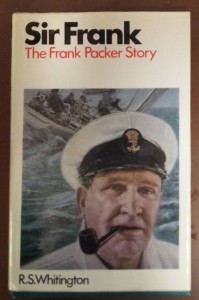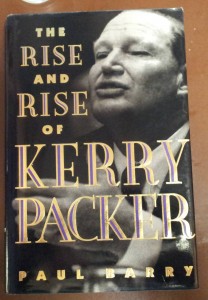Anyone living in Australia will have heard of the Packer family, they’re rich, influential, rather involved in media, and they’re a fascinating study. I’ve recently read Sir Frank: The Frank Packer Story by R. S. Whitington and also The Rise and Rise of Kerry Packer by Paul Barry, absolutely fascinating books. I’m writing about both of them together as it appears to be rather difficult to separate the two great men.
In the book Sir Frank: The Frank Packer Story we spend a good deal of our time reading about Sir Frank’s father and grandfather as, just like in all good biographies we find out about the ancestors. His father, Robert Clyde Packer, more commonly known as RC Packer was a force to be reckoned with, he apparently found 10 shillings on a race track and won enough money to migrate from Hobart to Melbourne. His career in journalism went to dizzying heights as he ended up starting a newspaper, Smith’s Weekly in 1918 with two other men. He finished his life trying to bring a business back from the brink and doing a good job of it despite being fought every step of the way.

Sir Frank followed in RC Packer’s footsteps despite being labelled ‘Academically Not Too Bright’. Sir Frank was a tough businessman who yelled at people, made jokes at people’s expenses but made up for it by helping them financially. There are a number of families who survived financially due to Sir Frank ensuring the employee had a job for life and that any surviving family members were looked after. He did make it hard for people to work for him as he didn’t like to spend money on office equipment such as cameras, typewriters, chairs, desks and the like so the union had an ongoing battle with him for 30 odd years in which he won. The employees really only got their needed furniture etc when he died and Kerry took over.
The Rise and Rise of Kerry Packer had almost double the number of pages of the Sir Frank Packer book and it had correspondingly more detail. We get to see Kerry trying to match and outdo his father. We are told Kerry has dyslexia and therefore doesn’t do much paperwork, preferring to have everything read to him, this is illustrated when he fronted up in court and the opposition had to wheel in their paperwork in a trolley while he had a slim manilla folder under his arm. We’re also told how dyslexia runs in the male gene line of the family with the inference that the Packers are even brighter than we’ve been led to believe as all their achievements have been made despite this handicap of not being able to read well. We also get to see what Kerry is like as a family man but not in as much detail as in the Sir Frank Packer book.

The Sir Frank Packer book by R. S. Whitington I found problematic. Whitington worked for Sir Frank for many years and had great affection for him, I feel that came out in the book. Both authors included themselves in their books but in this book I got the impression of unadulterated admiration and loyalty and that the author only included some of the negatives as he felt he had to try and look objective…and yet, we saw Sir Frank yelling at people a lot.
Neither book were easy to read. Sir Frank said to his author,
‘You’re not competent to write this story, of course’, he had said to me more in sorrow than in anger. ‘You’re a cricket writer. This is a financial story.’
Thank goodness Kerry didn’t say a similar thing to Paul Barry. Both books were more financial and business books than biographies and as both Sir Frank and Kerry were incredibly high flying business people with minds sharp as tacks and despite having been in business myself I found much of the detail challenging to follow. It does depend on what sort of business you’re looking at. Sir Frank was a journalist first and he knew the business from the ground up, he often wrote articles, headlines and rewrote both articles and headlines to suit himself, while Kerry was more a big business man. Kerry bought and sold many businesses, he used to buy low and sell high, he knew how to manage businesses, spot businesses in trouble but with promise and buy them, get them into the red again and then sell them at great profit. We’re not talking thousands of dollars of profit but 100s of millions of dollars or even billions of dollars. I mean BIG business! Kerry had the ear of Prime Ministers and despite protestations that he wasn’t at all influential he could coerce governments to make decisions that would make him even more money than before. Kerry owned Channel Nine!
Judging by the book Sir Frank was a dreadful father, subjecting both his sons to abuse in private and public. One day at the beginning of the holidays Kerry arrived home from boarding school without his tennis racquet, Sir Frank ordered him back to school to get it, not a big problem except the Packers lived in Sydney and the school was in Geelong, on the other side of Melbourne so this was a substantial trip for Kerry to make. Sir Frank sent his sons to boarding school at the ages of five and seven. Kerry also sent his son, James, to boarding school but at the age of 10 believing as a rich boy he should learn how to mix with other boys. We don’t see how Kerry speaks to his son but we do see that James is groomed and taught about business which is something we didn’t see in the same manner in the Sir Frank Packer book. It’s my opinion the Packer gene for being dreadful parents is diluted a little in each generation.
Paul Barry is also a journalist, he spent some time as the presenter for Media Watch being rather ascerbic about slack reporting in the media. He tried to interview Kerry for his book and was virtually given a slap in the face, Kerry was rather rude as he was to all journalists. I felt this book was a lot more impartial and showed less slavishness to Kerry than Whitington shows to Sir Frank. Don’t get me wrong, they are both well written but I much preferred Barry’s writing style.
Just to give you an example of something both men did which is easy to walk into a shop and see their legacy. Sir Frank Packer started The Australian Women’s Weekly, a magazine which has been a very big influence and is still going some 80 years later. Kerry started Cleo in 1972, it’s still going strong and has changed the face of women’s magazines, it’s known for giving information many magazines would shy from.
If you’re interested in the history of media in Australia I’d recommend these books. If you’re interested in business books then I’d definitely recommend these books.

